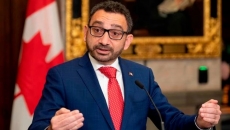BANGKOK - Prime Minister Justin Trudeau's tour of Southeast Asia includes a brief stop in Bangkok, which is a visit aimed at showing Canada is serious about forming deeper ties with the region.
The two-day visit to Thailand is for Trudeau to take part in the leaders' meeting of the Asia-Pacific Economic Cooperation forum, a group of 21 economies on both sides of the Pacific that work together to break down barriers to trade.
"Showing up is critically important. In Asia in particular, face-to-face relationships are vitally important," said Timothy Dattels, one of Canada's three representatives to the APEC Business Advisory Council.
"Long-term relationship building is absolutely critical to business; it's not all just done over the phone, at all," said Dattels, an investor specializing in the region.
He noted that major players in the region have sent their heads of government and senior ministers to Bangkok.
Rather than listing countries as members, the APEC group consists of 21 economies that include the special administrative region of Hong Kong, which falls under Chinese control, and Taiwan, which some states, including China, do not recognize as a country.
The organization features a series of technical committees and working groups that advise policy leaders on how to make business flow more smoothly between different countries, such as standardizing how transactions are recorded or setting rules on data privacy and digital trade.
Instead of negotiating policy or signing agreements, the group aims to come up with suggestions on how to boost economic growth and make sure different sectors are in regular conversation.
Andrew Cooper, a professor with the Balsillie School of International Affairs at the University of Waterloo, said the forum looms large for think tanks and business chambers, but not the general public.
"There's a lot more technical kind of legalistic work. That's important, but that's not going to draw huge attention from the public," he said.
He said that while APEC has paved the way for globalization and helped countries sort out the minutiae of red tape, it's been less able to articulate broader priorities for the region.
Trudeau is attending the APEC leaders' meeting as the Liberals gradually roll out an Indo-Pacific strategy, to form closer ties with certain countries spanning India to South Korea.
On Tuesday, Trudeau met with Thai Prime Minister Prayut Chan-o-cha at the ornate Government House in Bangkok.
Trudeau also signed a declaration with Chile's President Gabriel Boric aimed at easing some concerns about investor disputes that have held back the South American country from ratifying a cross-continental trade deal.
The Liberals will likely make announcements as the meeting closes Friday, but International Trade Minister Mary Ng said the main purpose of the visit is to affirm Canada's commitment to the region.
"It is about how we work together as a trading system, to make sure that cross-border trade flows happens," she told reporters in Bangkok.
Trudeau's itinerary suggests a fair amount of shaking hands and pull-aside chats, with events such as the "leaders' informal dialogue with guests" and a "working luncheon" for leaders.
Dattels praised the Liberals for making the visit, especially after announcing the outlines of the Indo-Pacific strategy.
"We have this massive collection of APEC nations, and to have a demarcation about our commitment to the region, which is very unique at APEC, is well chosen," Dattels said.
"We just need to be at the table and an active participant in the market."
As part of the strategy, the Liberals have deemed China a threat to global stability, and said Ottawa will seek trade ties with booming, like-minded countries.
Ng said Beijing's unpredictability is a large part why she is trying to form closer relationships with other Asian economies.
"Our exporters and our businesses depend on the strength of a rules based trading system," she said.
"We've had some difficulties with China over the last number of years, particularly around trade, and our exporters and our businesses have experienced that. It is precisely why we are here in the region."
Ng did not reference any specific events, though China boycotted certain agricultural products after the arrest of Huawei executive Meng Wanzhou.
The minister also would not say whether she expects Canadian businesses in China to suffer after Chinese President Xi Jinping accused Trudeau of harming diplomatic relations by sharing details with the media about a prior meeting.
Xi is attend the leader's meeting, which kicked off late Thursday local time, while Russia said it would send its Deputy Prime Minister Andrey Belousov.
While APEC focuses on sharing voluntary approaches to facilitating trade, the leaders' summit might be hindered by their diverging views on Russia's invasion of Ukraine and China's growing assertiveness.
"How much can be achieved at a meeting like this will inevitably be affected by geopolitical factors," Asia Pacific Foundation of Canada CEO Jeff Nankivell said in an interview before the meeting.
The question, he said, will be: "Is it possible to get consensus on outcomes documents in the current geopolitical context?"
Trudeau will leave late Friday for Tunisia, to attend the Francophonie summit.






